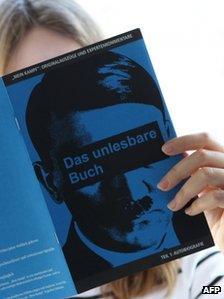Hitler book Mein Kampf: Germany extracts plan dropped
- Published

The publisher had planned to include a supplement with extracts from Mein Kampf with this Thursday's edition
A British publisher who planned to sell extracts of Adolf Hitler's political manifesto Mein Kampf on the streets of Germany has backed down.
The state of Bavaria, which owns the copyright to the book, had threatened legal action if publisher Peter McGee sold pamphlets containing the extracts.
Mr McGee sells reproductions of Nazi-era newspapers along with historians' analysis of their content.
He will now render Hitler's text illegible when his pamphlets are sold.
Mr McGee publishes newspapers from 1933-45 in the form of a magazine called Zeitungszeugen (which roughly translates as "newspaper witnesses").
He had planned to include a supplement entitled The Unreadable Book, containing extracts from Mein Kampf along with a commentary from journalism professor Horst Poettker.
The publisher said that an explanation of the "abyss of Hitler's crude ideas" and an "unmasking" of his central work was needed now, 70 years after the Nazis' crimes.
A supplement with readable extracts will now be available by mail order only.
The BBC's Berlin correspondent, Stephen Evans, says the publication of Nazi works is obviously contentious in Germany, even though they are easily available on the internet.
Neo-Nazi raids
In a separate development, police have raided the homes of four people suspected of being supporters of a neo-Nazi group believed to be behind the killings of 10 people.

The alleged neo-Nazi cell operated for more than 10 years without being noticed by German security agencies
The existence of the neo-Nazi cell came to light in November when two of its members died in an apparent joint suicide and the third gave herself up to authorities in the eastern state of Saxony.
The office of Germany's federal prosecutor said that 110 police officers had been involved in today's raids, on apartments lived in by the four suspects, two business premises associated with one of them, as well as three flats in Thuringia and Baden-Wuerttenberg.
Prosecutors say the aim of the searches was to find out more information about the group's support network and the origin of their weapons.
- Published29 November 2011
- Published20 November 2011
- Published18 November 2011
- Published15 November 2011